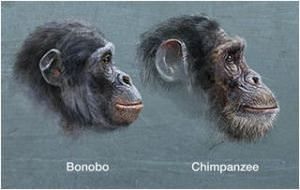
Exchanges reduce tension and promote the formation of social bonds.Females exchange various types of social behaviors such as genito-genital rubbing, peering, and food sharing.Compared to chimpanzees, bonobo females in managed care are more socially integrated and bond more frequently.Females support each other more often than they support males.Females do not groom each other more than males groom each other but they are more often near each other.Females establish dominance relationships among themselves, but they are less expressed or obvious than the males'.Because females' time of ovulation is hidden and multiple matings are the rule, there may be little reproductive benefit to males of being high-ranking.Male rank did not determine mating success, probably because female mate choice also plays a role.Highest ranking males did not necessarily have the most copulations.Males compete for rank, which is influenced greatly by rank of mother.Males are rarely near one another and do not often groom each other.Males established hierarchical dominance relationships among themselves.A study by Stevens et al (2008) found bonding patterns in four managed care bonobo groups and wild populations to be similar:.Both chimpanzee and bonobo societies have social interactions that are extremely variable, with the factors affecting the differences still not clear.Chimpanzees in dense forest habitats of Tai Forest in Côte d' Ivoire, Africa show similar party sizes and association patterns to bonobos who also occupy forest habitats.(Hohmann & Fruth 2002) (Boesch & Boesch-Achermann 2000) Other studies suggest "differences between chimpanzee and bonobos could be related more to the ecological conditions" than to true species differences the two species may, in fact, have similar behavioral diversity.Bonobo female bonds observed in managed care may be a side effect of life in managed care.

Aggression by males towards females less than seen in chimpanzees.Males show dominance relations among themselves with less aggression than shown by chimpanzees.Form larger parties biased towards females.Females tend to not travel with males in order to avoid aggression.Traveling parties tend to be small and male dominated.Male dominated based on alliances with other males, often supported by considerable aggression.

Chimpanzee society characteristics: (Goodall 1986, Watts 1998):.Bonobo ( Pan paniscus) and chimpanzee ( Pan troglodytes) groups in many studies are shown to have distinct differences in social organization.




 0 kommentar(er)
0 kommentar(er)
